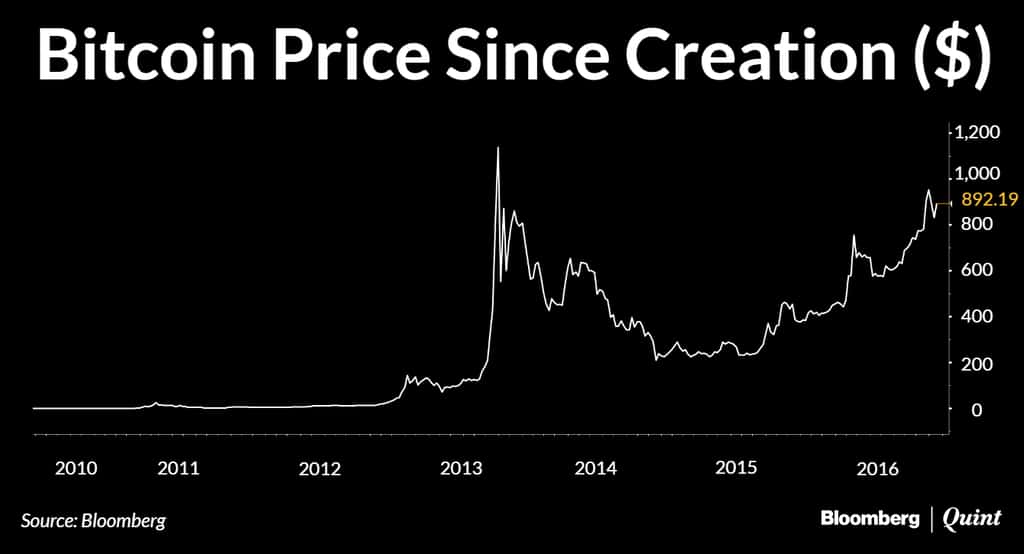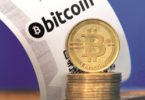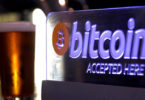When the Chinese Yuan was sliding sharply earlier this month, the Bitcoin surged. The same happened when the Indian government abruptly banned notes of Rs 500 and Rs 1000. Inevitably, for one reason or another, it falls almost as sharply as it rises.
Welcome to the world of the Bitcoin, the most volatile currency out there. Although many would question that description and prefer to a call it a cryptocurrency, which is what it is.
The Bitcoin has now been around since 2010. Despite many questions about its usability in the real world of transactions, it has survived. Just in the last 30 days, according to data available on data platform bitcoinity.org, over 18.5 crore bitcoins were traded globally.
The first bitcoin transaction reportedly took place on May 22, 2010, when Laszlo Hanyecz bought two pizzas for 10,000 bitcoins. Each of those bitcoins was then worth $0.008. The value of the bitcoin climbed rapidly in 2013, but then crashed dramatically after China tightened rules on bitcoin transactions.

Since 2013, the bitcoin has touched highs of over $1,100 and has crashed all the way down to around $200, before climbing back to just over $890.
Along the way, the Bitcoin has given rise to a number of ancillary businesses – those that ‘mine’ Bitcoins and those who trade them. Unocoin Technologies Pvt Ltd does the latter.
Unocoin was started by a group of bitcoin aficionados in late 2013. The idea, said Sathvik Vishwanath, the company’s co-founder and chief executive officer, was first discussed at a meeting with ‘bitcoiners’ at Bengaluru’s MG Road. At the time, there was no secure way to buy and sell bitcoin and transactions invariably took place over the counter using cash.
So initially while we propagated great things about bitcoin, how it works, and how it is superior to other modes of value transfer, the one question we couldn’t really answer was where people can buy bitcoins themselves. There was no platform for people to buy bitcoin in a safe manner. So we thought of putting together the platform, where people can buy it and sell it securely. And that pretty much gave rise to the birth of Unocoin.
Sathvik Vishwanath, Co-Founder, Unocoin
The company was bootstrapped till September last year, when it raised $1.5 million in its first round of funding. The investors, according to a company press release, included Indian entities Blume Ventures, Mumbai Angels, and Ah! Ventures, as well as a smattering of international investors-Digital Currency Group, Boost VC and Bitcoin Capital.
What Does Unocoin Do?
Unocoin is an exchange that facilitates the buying and selling of bitcoins online. It has also tied up with merchants that sell products and services in exchange for bitcoin.
The other prominent exchanges that offer the same service in India include Zebpay, Coinsecure, and BTCXIndia. These exchanges derive their revenue either by charging a transaction fee, which is a percentage of the transaction value, or from the difference between the buying and selling price of bitcoins.
Unocoin gets its revenue primarily through transaction fees. For all bitcoins bought or sold on Unocoin, a fee of 1 percent is charged. The user also has to bear the service tax of 15 percent on the transaction fee, as per information on the company’s website.
So, at the current value, for every bitcoin bought using Unocoin, the company earns close to Rs 683.
Sending and receiving bitcoins between Unocoin users is, however, free of cost.
“There are some in the industry that do not charge a transaction fee at the moment, but they will likely start doing so. There are others, that currently charge as low as 0.3 percent of the transaction value as a fee,” said Vishwanath.
While Coinsecure charges a transaction fee of 0.3 percent, BTCXIndia charges 1 percent inclusive of taxes.
Unocoin’s Fate Is Tied To The Bitcoin
“Either it (the value of the bitcoin) will become a few hundreds of thousands of dollars, or it could be zero, one of two… It’s binary,” said Vishwanath. That, then, is also the fate of Unocoin.
But, Vishwanath believes that with acceptance for the cryptocurrency growing in India, and with the value rising, volumes on his exchange will continue to grow at 15-20 percent.
Currently, the company sees 150-250 coins exchanging hands on a daily basis, and around 5,000 coins in a month. For the year ended December 2016, Unocoin handled transactions of over 40,000 bitcoins, Vishwanath said, adding that this is approximately half the volume of trades that take place on Indian exchanges. BloombergQuint could not independently verify these claims.
The company’s current user base stands at around 125,000, of which, 14,000 joined in November after the government’s announcement of demonetisation of Rs 500 and Rs 1,000 notes.
Still, Unocoin’s volumes are a small fraction of those seen on China’s bitcoin exchanges. In the past 30 days, three Chinese exchanges accounted for over 98 percent of the 18.5 crore bitcoins traded globally, data on bitcoinity.org showed.
While BTCC Ltd accounted for 37 percent of trades, OKCoin handled 31.5 percent and Huobi captured the remaining 29.6 percent.
The Regulatory Scenario
The trading of bitcoin and other virtual currencies is not illegal in India. However, the Reserve Bank of India, in a note issued in December 2013, has said that the creation, trading or usage of virtual currencies as a medium for payment are not authorised by any central bank or monetary authority.
In the same note, the RBI cautioned users, holders, and traders that virtual currencies, including bitcoins, held potential financial, operational, legal, customer protection, and security related risks.
Since then the nervousness around the idea of a cyrptocurrency has settled and there has also been some official recognition of its potential.
A committee on digital payments headed by Rajan Watal, the principal advisor to the Niti Aayog, recently recommended various measures to incentivise digital transactions. Among other recommendations, the committee deliberated upon the feasibility of a digital currency issued by the central bank and batted in favour of it. It observed that a significant benefit of such a currency would be the “extreme” difficulty in counterfeiting.
The Committee notes that several benefits of digital currency, including the instantaneous settlement of transactions, reduction of costs of cash, ability to provide a more comprehensive and unified source…The most significant benefit however, is that the technology makes it extremely difficult to counterfeit, and more importantly enables the central bank to detect the existence of counterfeit currency on a real-time basis.
Recommendations Made By The Committee On Digital Payments
Skeptics remain doubtful that the bitcoin can succeed as an alternative to existing modes of transaction.
“I don’t really see the bitcoin becoming a widely traded currency, because there is no clarity on how the value is derived; there is no underlying value. As a result, there is a possibility that even small players can rig the market,” said the head of treasury at an international bank while requesting anonymity.
On the other hand, Vaibhav Parikh, partner at Nishith Desai Associates, the law firm that represents Unocoin, believes that if the bitcoin is regulated it will gain credibility and become more widely accepted.
“Bitcoin is not a currency and should not be viewed as such,” said Parikh. “It is a commodity. The analogy to be used here is gold. The reality is that like the bitcoin, even gold’s value is perceived. Its value is derived from the fact that there is a finite amount.”
Parikh’s law firm has advised Unocoin and its peers to opt for self-regulation. He believes that with regulation, the potential use of bitcoins for illegal activity can be reduced.
On its part, Unocoin intends to use the funds it has raised to refine its remittance service and add more merchants to the 1,500 it currently has on board.
“We anticipate that by the end of 2017, monthly volumes on Unocoin will be three times the current level,” said Vishwanath.







